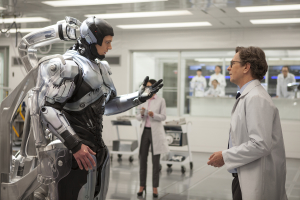“RoboCop” is neither new nor improved, but it doesn’t deserve to be scrapped completely
February 17, 2014
It’s another year and another chance for studios to reintroduce popular movies from thirty years ago with better special effects and different faces. In this case it’s Paul Verhoeven’s science-fiction classic “RoboCop.”
Albeit, I haven’t had the chance to see the original movie. That didn’t stop me from giving this one a shot and I wasn’t entirely displeased.
In the year 2028, multinational corporate monster OmniCorp is looking to bring its products of drones and robotic policemen to the streets of America. Due to the public supported Dreyfus Act, OmniCorp is forbidden to place their technology in U.S. cities, which is costing them potentially billions of dollars.
To curve public opinion, OmniCorp CEO Raymond Sellars (Michael Keaton) gets the idea to put a man in the machine and sell it–him–to the public. With the help of chief scientist Dr. Dennett Norton (Gary Oldman), they have the technology for their RoboCop prototype. They just need the right person.
Alex Murphy (Joel Kinnaman) is a dedicated Detroit police officer, husband and father. In critical condition following a car bomb coordinated by a ruthless drug-arms dealer (Patrick Garrow), Murphy becomes the ideal person for the program. With the consent of his wife, Clara (Abbie Cornish), Murphy is transformed into the high-tech marvel of the police force, much to the enjoyment of Sellars and OmniCorp.
As RoboCop, Murphy is determined to capture those involved with his own attempted murder and protect the streets while fighting to retain his humanity, despite the constant interference of OmniCorp, Sellars and a reluctant Dr. Norton.
“RoboCop” is Brazilian director Jose Padilha’s first American movie, though it probably wasn’t smart to introduce himself to the American audience with a remake of an iconic sci-fi film.
Despite being advertised as an action movie, there is barely any blood (this version is rated PG-13 as opposed to the original’s R). Robocop uses a stun gun for arresting criminals, and in one shootout scene the audience watches most of the action through RoboCop’s heat-sensor and the criminal’s night-vision goggles.
Joel Kinnaman does a decent job at being the man behind the metal visor and armored plating, although it probably had something to do with the RoboCop voice. Watching him switch from Murphy (visor up) to RoboCop (visor down) can be exhilarating, signaling to the audience the action is is about to start.
Too bad Padilha doesn’t give Kinnaman much time to interact emotionally with the other characters, especially his family. And Jackie Earle Haley as the sarcastic Rick Mattox, military tactician for OmniCorp and RoboCop’s trainer, provides a funny and menacing foil to the semi-artificial RoboCop. If only he had more to do.
One of the major problems with the movie is the lag in pace. The first part of the film spends most of the time on the creation of RoboCop and the preparations. The movie continually jumps from one critique of American society to another–from corrupt police officers to greedy corporations to crime control–that the plot becomes muddled and cliched. And even the final assault at the end of the movie seems rather forced and there for action’s sake. The resolution. . . predictable.
And then you have Samuel L. Jackson as Pat Novak, the O’Reilly-esque news pundit of the conservative, pro-OmniCorp talk-show program, The Novak Element. He yells to the audience in the first several minutes of the movie and cursing (bleeped, of course) at the end. Novak appears sporadically throughout the movie and in such a compact amount of time that he doesn’t really need to be in it at all.
I give “RoboCop” two and a half stars out of four. I’ll admit, I found the movie entertaining. It’s going to be tough to contend with the original, but there are worse ways to spend an hour and fifty minutes.






